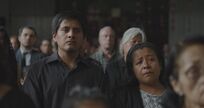When it was screened in Cannes, I heard a lot of applause for the film, and then I read some criticisms of it one after another, and finally I can enjoy it at the online screening at the Chicago Film Festival.
The film starts with naked women with green paint, then there are shots of furniture being thrown downstairs, and then we see green paint in hospitals and on the streets. The patient was expelled from the hospital, and an elderly man received a transfer note from the doctor telling him to prepare 200,000 pesos to go to another hospital.
On the other side, the newlyweds are dancing, and then they receive gifts from friends and relatives. Among the guests were many military leaders. Everyone is waiting for the judge to arrive. The bride's mother, who is responsible for keeping the money, was the first to notice that green water was flowing from the faucet at home—a sign of a problem at home, but when she told her husband, the water was back to its normal color. After that she checked the color of the water again and again and every time I thought it would be green, but every time it was normal. A man splashed with green paint then appears, but she wipes the paint off and Xunsu blends in with the celebration. As if everything outside doesn't matter.
The old man from the hospital came to the wedding scene before. All are in formal suits. Except for the security guard Philipo who did not wear a suit jacket, only the old man did not wear formal clothes. He worked here eight years ago, along with his nephew and sister, and wanted to lend money to his wife's treatment. The bride's mother received countless cash, but instead of giving him some of the gift money, she chose to ask for change from various people and collected some for him. The old man and the bride are the closest, and the bride wants to give him money, but finds that only her mother knows the password of the safe. When she took the credit card and wanted to give it to the old man, the old man had already left, so she asked the old man's nephew to deliver the credit card with her.
At this point, the late judge finally arrived. With her, there are people who are about to start looting.
The first reaction was naturally to call the security guard Philipo, but Philipo, who was not wearing a suit jacket, was of course not in the same group as the dressed up old ladies: he fired the first shot and hit a person in the foot, and then forced the bride's mother to open the safe , and then blow her head off.
At the same time, the bride and the old man's nephew are on their way, as if escaped. The first part is over, and the progress bar is about 1/3 past. If it only ended here, it would be a more straightforward Mexican version of Parasite, but this movie is not.
The highlight of the first part is that the pacing is good, and everyone gives enough information—enough to make the killing start both unexpected and reasonable.
Clothes are the biggest spoiler for the movie : newcomers and guests are dressed up, security guards only wear shirts and no coats, common servants wear servants' attire, looting people wear casual sports, and the old man who borrows money wears a beige jacket , the old man's nephew and sister wore less expensive suits and skirts, and the real boss also wore low-key suits. Everything that happens at the end of the first part and the second part is laid out in the costumes of the actors.
The story of the first part—street protests, hypocritical rich people, revolt from the bottom, looting—is like today’s news: it’s set in Mexico, but it could be America, it could be Thailand.
The second part begins to utopian - not because it is impossible, but because this part of the real event is usually not known, and what is known is always a modified version - in the second part , the director offers a possibility, an imagined state of the country.
The second part starts like this: the streets are calm again — much calmer than ever — with soldiers patrolling the streets, standing guard at the gates of the wealthy, with no protesters in sight. But anyone who wants to take to the streets, such as an old man's nephew, is quickly subdued. The nephew said that there was an eldest lady at home, and the soldier said, I will help you send her back—of course they didn’t. What exactly happens after this is not the highlight of the second part.
The second part of the story is like the present, more like the past, and possibly the future. Streets are blocked, credentials are needed to get in and out, credentials are needed to work, that's what everyone is going through in 2020 - whether you're in the US, France or China - so I say like now. The protests at the bottom turned into a coup, which was like Egypt, but also like Turkey. At the same time, because all of these things have happened in the past or are going on in the present, they can also happen any day in the future.
This is the most rewarding aspect of the film: it takes the viewer into a story that could have happened at any point in time, a parable that spans time and space. One of the questions I keep thinking about as I watch is, where the hell is this? This story can take place in any time and space, and the audience can be anyone : the rich, the soldiers, the sincere workers, the sick, the looting.
In this flowing time and space, everyone has done very reasonable things in front of their choices, but it seems that no matter what they do, they can't change the outcome. It's this feeling that's shocking.
View more about New Order reviews











